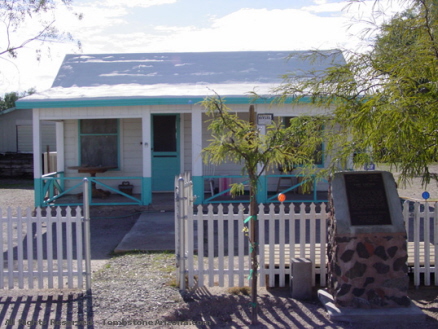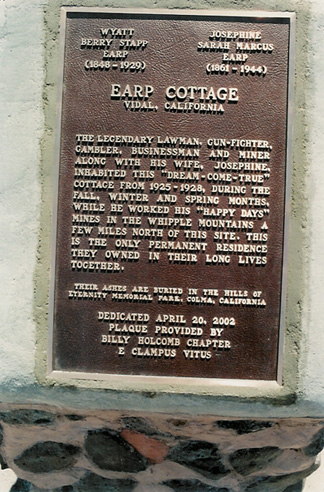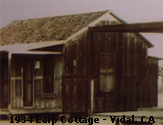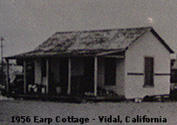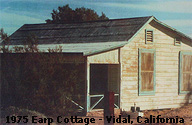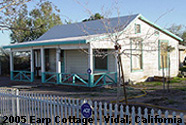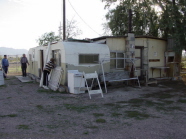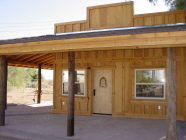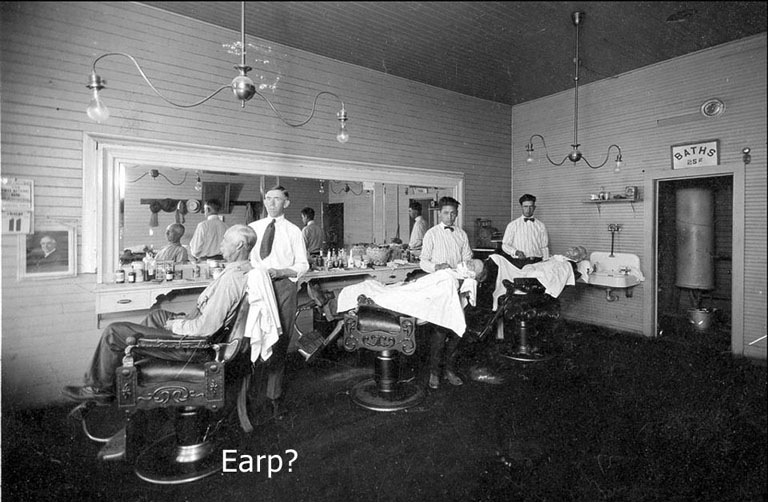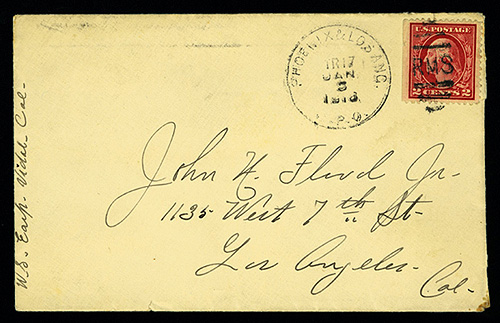
Vidal, California Home
"I can readily
understand why both Mrs. Earp and yourself long for the desert. It
is the same old pioneer spirit that will never drown while life remains"
William S. Hart
"I am
anxious to go out on the desert in the open air, the sun will benefit me
greatly" Wyatt Earp
The only permanent residence
Wyatt & Josie Earp owned in their long lives together
"My Dream Come True" Mrs.
Josephine Earp
The Earps came to Parker Arizona
in 1905, it was the lure of minerals in this area, still officially persona
non grata in Arizona (had a warrant for his arrest) Earp lived and mined
on the California side of the Colorado River primarily between Vidal and
Drennan which in the 1930's was renamed "Earp". Wyatt and Josie lived
in tent camps and later in this small house in Vidal California, not far
from Parker, Arizona. Wyatt and Josie Earp spent their winters in this
small cottage from 1917 to 1928.
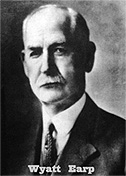
In addition to locating and working
his mines Earp would travel up and down the river for business and gambling.
Wyatt Earp recorded various claims at the foot of the Whipple Mountains.
Folklore would say his dog "Lucky" who accompanied Wyatt on a number of
walks found one of his lucky gold mines.
Wyatt made use of the winters of
his concluding years running these claims in the Mojave Desert and settling
with Josie in their Vidal cottage. He and Josie spent their summer in Los
Angeles, where they made friends with early Hollywood actors and carried
out real estate and mining investments.
In July 1928 Wyatt reportedly discovered
a very rich vein of gold which he thought might be on tribal land but didn't
live long enough to pursue it.
On Jan. 13, 1929 Wyatt Earp passed
away in Los Angeles at a ripe age of 80. Cowboy actors Tom Mix and William
S. Hart were among his pallbearers. Wyatt's cremated ashes were buried
in Josie's family parcel in Colma, California. When Josie died in 1944
at the age of 75, she was buried there next to him.
Among his lasting legacies as frontiersman,
lawman, gambler and prospector, a post office near his Mojave Desert mining
claims down the Colorado River on Route 62 carries the name -- "Earp, California
92242." The town wanted to call itself "Wyatt Earp" but Congress wouldn't
allow it as Wyatt had made himself a reputation of an outlaw. However,
Congress did approve the name "Earp".
Home was dedicated and a plaque
placed at the private
residence in 2002. It should
read from 1917 - 1928
1934
1956
1958
In 1958, the home was remodeled
and a Bathroom & kitchen were added to the rear of the home.
1975
2005
January 2005 the clean up and restoration
begins on the private residence.
Jan. 2005
Above is the old shack behind
the Earp home as it looked in January 2005
Nov. 2005
Above is the same old shack
less than a year later.
If you're enjoying
this site, please help me promote it to your family and friends by simply
clicking the button below and sending it to your mailing list.
I would like
to Thank everyone for your continued support, Thank you.
Vidal, California
Population: 48
Elevation: 1077
"4 miles from the river and 5 feet
from Hell"
Average summer Temp: 109.2 degrees
(National Average 86.46 dregrees)

Is this is Wyatt getting
a haircut in Vidal?
From San Bernardino Sheriff's Office,
1853-1973, 120 Years of History:
WYATT EARP
DEPUTY SHERIFF
SAN BERNARDINO COUNTY
By Woody Campbell - Oct. 14,
2004
Out in Vidal, a small community near
the southeast corner of San Bernardino County's kingsized domain, there
is a historic house that once served as the home of one of the Old West's
most famous law-enforcement officers--Wyatt Earp.
The little white frame house has
been altered and enlarged some since the days of forty years ago when Wyatt
and his wife, Josephine, lived in it and Wyatt operated his Happy Days
Mine in the nearby Whipple Mountins. A porch wing has been added, but the
little house serves as a reminder of the peaceful later years of Wyatt
Earp's life.
This little residence, as well as
former Earp cabin now preserved in the little town named Earp, call to
mind the fact that Sheriff Walther Shay once recognized the former Arizona
marshal by presenting him with a San Bernardino County deputy sheriff's
badge.
Earp's home was at Calzona at the
time and served as his residence during the winter months. In summer, when
the temperature built up to the point where it was uncomfortable to mine
the Earps moved into Los Angeles. Calzona then had a store, a railroad
station, a post office and a small cluster of houses. It was also on the
rough-dirt road that led to the Colorado River ferry plying betweeen what
was then Drenan and Parker, Arizona.
When Calzona had one of its periodic
declines the Earps, along with some others, moved to Vidal four miles west.
It was at Vidal that the old law officer figured in the somewhat unorthodox
capture of a "bad man" who had dropped off the Phoenix train and was trying
to clean out the Charles Bunnell store. Bunnell called Constable James
Wilson to arrest the intruder, who was waving a gun. Wilson asked Earp
to help him and the old marshal readily agreed. The constable mapped his
prospective capture by asking Earp to go in the store's front door whle
he, Wilson, waited by the back one to arrest the bad man as he fled. Well--it
didn't happen that way! Earp walked in the front door, ordered the "bad
man" to hand over his gun. The order was obeyed and Earp grabbed the intruder's
collar and marched him outside, where he called for Wilson.
The incident brought a lot of good-natured
joshing with Constable Wilson on the receiving end--particularly when it
was known that Earp was not armed.
It was the Brunnell store incident
that served to briefly bring notice of Earp's desert residence to San Bernardino.
Sheriff Shay sent congratulations and asked Earp to drop in at the sheriff's
office in the old county jail on Court Street the next time it was convenient.
Shay commissioned Earp as a non-salaried deputy, but failed in his desire
to pin on the badge. The Earps stopped in San Bernardino some weeks later
unannounced. Wyatt went to the sheriff's office on a day when Shay happened
to be out of the city. To Undersheriff Tom Carter went the honor of badge
presentation.
Inspector Hal Oxnevad of today's
sheriff's force lived in Vidal for years where he combined cattle-raising
with duties as head of the sheriff's substation there. He and Herbert Bradley
of Whittier, a onetime Calzona resident and homesteader, both tell of the
"bad man's" capture.
Last summer five onetime Calzona
residents gathered for a reunion at the mobile-home of Lester Munn of Muscoy.
Munn and his brother-in-law, Bradley, had the Earp mine under lease one
year and took out a fair quantity of gold. All five of the former Calzonans
recalled much about the tall, aging mine-operator who had been one of the
nation's famous breed of western-law officers.
Although his health no longer permitted
mining, Earp and his wife continued to spend the winter season in the area.
It was by unanimous petition of the residents that the United States Postal
Department and the Santa Fe Railroad changed the name from Drenan to Earp
a year or so after the old marshal died (January 13, 1929).
Things just didn't seem the same
at the Brunnell store, where Wyatt's chair at the card table was no longer
occupied by the tall, gray man with the slow, deliberate speech; the man
respected so highly by his neighbors.
-- woody
Wyatt and Josie Earp wrote
many letters from their home in Vidal, California.
Below our letters to and
from...
Wyatt and Josie Earp,
Hollywood actor William S. Hart
and Earp Biographer Stuart
M. Lake. Highlighted in red
are comments about the Earp home in Vidal.
Wyatt Earp Signed
Envelope from Vidal home
Wyatt Earp Signed Envelope
5.5x3.5” envelope postmarked
from “Phoenix & Los Angeles” on January 5, 1916 bears the handwriting
of legendary American folk hero, Wyatt Earp. The envelope is addressed
entirely in Wyatt Earp’s handwriting to John H. Flood Jr. at “1135 West
7th St., Los Angeles, Cal.” Flood, a friend of both Wyatt and Josephine
Earp, was a mining engineer who helped the old frontier lawman write with
an autobiography, which was never published. Flood later produced a manuscript
of Earp’s life entitled, Wyatt Earp. The return address is written vertically
by Earp along the left edge of the envelope, “W.S. Earp, Vidal, Cal.”
Price realized at a recent auction:
$5,875.00
My dear friend:
Here we are, back in Los Angeles
again. The weather was beginning to warm up out on
the desert and the coast is a comfortable change. I like the climate
here but Mrs. Earp is not so enthusiastic about it so we, probably, will
go North before long.
I thought, perhaps, you might want
to review the story. It is completed now, with the changes and corrections
that Mr. Flood had in mind to make.
You can help me very much, I know;
in the matter of publication particularly. There are the questions of the
copyright and the royalty and the separation of the story rights from the
picture, if you think it would be something worth while now, to have filmed.
You see, this experience is all new
to me and I feel that I want to turn to you for advice. Would I fit in
with your program some day early next week? It was in my mind to say "Hello!"
to you anyhow and this affords me a good excuse.
Mrs. Earp and I are feeling fine.
We have wondered many times about your sister and if her condition improves.
We are holding the thought that it does and wish that we may be especially
remembered to her.
We also trust things are right with
you; you are very much in our minds. When you can spare a moment, telephone
us or drop us a line.
I am
Your friend,
/S/ Wyatt Earp
- Earp to Hart, June 3, 1926
Dear Mr. Hart:
If the New Year is as full of cheer
and good will as your Holiday Greeting, I shall get off to a fine start.
Both Mrs. Earp and I wish to thank you for your kind telegram. What a grand
old world this is!
I had wondered about you and wanted
to say hello! I haven't heard from you for a long while. But I guess I
shouldn't expect too much; this is a season for taking inventories, and
of income tax reports, etc., and other nightmares; all of which does not
burden me to a great extent.
I am getting
ready to leave for the desert in a few days. After Monday, my address
will be 2703 Telegraph Avenue, Oakland; for a week at least. Then
I shall be in Los Angeles again for several days before starting for the
mine.
Should you receive any information
regarding the story, that you might think worth while to communicate, you
might get in touch with Mr. Flood, at his residence address: 4303 Halldale
Avenue, Los Angeles; Telephone: University 1977. I have arranged with him
to attend to my affairs during my absence. I would like to hear from you.
You know, you can't scare me with bad news about the MS; what is a little
think (sic) like that between us.
Both Mrs. Earp and I wish, more and
more, that your sister's health will improve; that will be the Happiest
New Year we could wish for you both. Please remember us to her with this
thought, and we send the kind regards.
Your friend,
/S/Wyatt Earp
- Earp to Hart, January 21, 1927
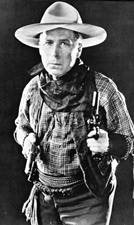
Dear Mr. Hart:
Mr. Earp and I were very glad to
receive your nice letter of a week ago and we appreciate, very much, your
interest and efforts in bringing the story to the attention of the worth
while publishers.
Not many efforts meet prompt response;
to do a thing right requires time. We look upon the matter from the same
view-point as you look upon it: if it isn't done right, and by the right
persons, we wouldn't want it done at all. So if nothing ever comes of the
story, we shall not be disappointed; we would not even say Ouch!
Mr. Earp went
on to the mine several days ago and he asked me to write you before I left
the city; I shall follow him tomorrow. For the next two months, our address
will be: Vidal, San Bernardino County, California, and we shall be glad
for a word from you occasionally. The mail service is not always the best
out there and I would like to suggest that your mail contain a return address.
It is not always so prompt in the city either. A Christmas Greeting from
one of our friends was not delivered to us here in Los Angeles, and I have
wondered if the little remembrances to you and your sister, from Mrs. Lehnardt
and ourselves, had miscarried; I would want to send a tracer.
We will be
quite a family on the desert this year; I am taking my niece with me from
San Francisco, who is just recuperating from a serious illness. I believe
the sunshine will work wonders. Would it be possible that your sister's
health would be benefited by such a trip; that would be wonderful! We both
send her the kindest regards and we trust this will be, for you, the most
successful year.
Very cordially yours,
/S/ Mrs. Wyatt Earp
- Josie to Hart, February 1, 1927
Dear Mr. Burns:
Your letter
of April 30th was received while I was at Vidal, and should have been answered
sooner, but my health not being particularly good, I have deferred writing
until the present, after having returned to Los Angeles.
The matter of your story, I am taking
up with the publishers, under date of May 24th, a carbon copy of which
letter, I am inclosing herewith. I believe this letter to Doubleday, Page
& Company will explain the situation as I see it. I do not know of
anything that I might add that would make things any clearer.
I believe, Mr. Burns, if you had
communicated the idea of your story to me, after your second visit to Tombstone,
last Fall, the present situation might have been avoided. Surely, I have
only regret to express over the entire matter. Under the circumstances,
however, there is no other position possible for me to assume. My own interests,
certainly, must be the first consideration, but you may be assured that
anything that might come after, would have my earnest attention; that,
I believe, is as fair as can be.
Both the publishers and yourself
have my whole-hearted good will; I am hoping the situation my be made clear
to us all. Write me again; I shall be pleased to hear from you.
Yours very truly,
/S/ Wyatt S. Earp
(March 27, 1928)
Dear Frank Wilstach:
Wyatt Earp
is at his mine that he owns. The address is Vidal, San Bernardino County,
California. It is located on the Colorado River about fifty or seventy
five miles above Needles. Write him a letter, as per the above address
and it will reach him. He may not come back to Los Angeles for several
months, or I would be glad to speak to him personally about the photograph.
Yes, there was a row over the Burns'
book and there should be one. I think Wyatt Earp is entirely justified
in his contention.
With best wishes,
Sincerely yours,
William S. Hart
- May 4, 1928, Earp to Hart:
My dear friend Bill Hart:
It is a long time since I have received
a letter from you, all of which I readily understand since I believe I
have not yet answered your kind message of some months ago. Nevertheless,
I like to hear from you occasionally even though I am a poor correspondent.
I am interested to hear about the new ranch. You and your sister must be
very comfortable there; it is the kind of a place that I would like. The
thought I have in mind is that your sister's health has been benefited
- the higher altitude, the clearer atmosphere - I have always thought the
site for a home was well chosen.
Mrs. Earp speaks of a package which,
she says, she mailed to your sister about the middle of March. I believe
it was directed to the Newhall address; a little uncertain, and she wonders
if it were delivered promptly. So much confusion about that time; the St.
Francis Dam disaster occured shortly after - what a terrible affair! We
have wondered if you were affected in any way.
I have not forgotten your fine letter
of December sixteenth last, the copy of the Literary Review together with
the criticism of Bernard De Voto. This surely is a belated appreciation
but I assure you it is real, and I want to thank you. Neither has your
suggestion failed of what purpose I had in mind. Rather my continued ill
health has inclined me to a condition of lasitude. And early in January,
I was in receipt of a letter from a Mr. Stuart N. Lake, 3916 Portola Place,
San Diego, asking for my story. He writes in a modest and unassuming manner,
and explains that his material has been used by The Saturday Evening Post,
The Outlook, and others. Perhaps you are acquainted with him, or know of
him. Will you not kindly advise me in this; I already have promised him
an interview upon my return to the Coast. I am inclosing his letter for
your review.
Also, I am inclosing a letter, under
date of April 3rd, received from a Mr. Frank J. Wilstach; you, perhaps,
are well acquainted with him. I rather expect to send him a portrait of
myself, as he requests. Mrs. Earp sent for a few several weeks ago, and
they ought to be on the way.
Messrs. Doubleday, Page & Co.
seem to have disregarded their promise to me - that the serial rights to
the story "Tombstone" would not be sold to others for publication - and
did enter into contracts with the Hearst Publications and the Boston Post.
There may have been others, I do not know; these being the only concerns
which were brought to me (sic)attention. My protests, however, brought
courteous responses and prompt discontinuence. It is difficult to reconcile
such actions of a supposedly reputable firm with such practices.
We are pleased to note your return
to the screen, which, a press article of a few weeks ago announced for
the near future. This news is gratifying to your admirers, and will fill
a vacancy that has been felt for a long while. Surely it is proper that
I should tell you this. I say it with all modesty for it is but an echo
of the expressions I hear - your friends and admirers - everywhere.
Presently I
shall be back in Los Angeles; the third week in May at the latest. This
has been a late season on the desert for me, both in coming and returning.
Mrs. Earp wishes to be remembered; please give our regards to your sister;
we trust you both are well. I hope you will write me, I would like to know
how you are. I am
Your friend,
Wyatt S. Earp.
(Earp to Hart, July 4, 1928)
My dear friend Bill Hart:
Here I am back
in the city again; I really am back twice as I arrived in Los Angeles early
last month and then I made another trip to the desert. Now I am to go again
tomorrow but only for a short period. I have several men working on my
property and I want to see that the work is all completed; the summer is
getting too far along for comfort out at camp.
When I return to the city again I
would like to make you a visit; this will be a nice way to answer your
fine letter of May the eighth. I enjoyed hearing from you immensely; your
letters do me good. The letter from your young friend, which you inclosed,
is very interesting. The young people of today, with all their opportunities
and advantages, and with the proper guidance and fellowship, develop into
splendid grown-ups. It is good to have such fine friends. I am returning
the letter here, and I want to thank you for the privilege of reading it.
I also want to thank you for your
appraisal of Wilstach; I could not place him in my mind. He asked very
earnestly for one of my portraits, and I shall see that he gets it. Of
course you were correct about Bat Masterson being in Deadwood. He was there,
as you say, about the time of Custer's battle on the Little Big Horn.
Mr. Lake came up from San Diego early
in June; shortly after my return to the city, and we had a very enjoyable
visit - a nice, modest young fellow. Somehow, when he went away, there
was a felling (sic) of assurance that he left with me; I like him very
much. He is anxious to write the story; wants to begin right away. I shall
talk the matter over with him again after I return from the desert.
I believe the chord in your letter
which struck me most spiritedly is the good news about your sister's health;
such a noted improvement in a comparatively short period - it is most remarkable.
Mrs. Earp and I both are so pleased to hear this. We rejoice with you and
our thoughts will be holden of better reports - a little time works wonders.
Will you please say this to your sister for us, and with our kind regards.
We say the same to you and wish that this will be a big year for you -
health, and happiness, and success; a lot of it.
Write me and come and see us.
Your friend,
/S/ Wyatt S. Earp
Earp to Lake, November 2nd, 1928
Dear Mr. Lake:
Your letter came yesterday. Am
sorry you won't be able to come here before I leave for the mines. I will
be glad to have you and Mrs. Lake make us a visit at the mines.
Mrs. Earp will attend to the Record for you and will do what I've ask of
here in regard to getting the prints. Will you return the newspaper clipping
to me. I want to thank you in advance for the copies you spoke of sending
to me when you have the time to type them. It certainly does make me feel
good to know I have so many sincere friends amongst the better class of
men.
Very best of wishes for you and Mrs.
Lake.
Sincerely Wyatt Earp
- Earp to Hart, November 13, 1928
My dear friend Bill Hart:
Here we are
packing our things again (rather Mrs. Earp is doing the packing and I am
looking on) for our annual trip to the desert. As usual, I am becoming
a little restive - just so long in the city, then back to the hills again.
This is just a little friendly chat
before we leave. I have not heard from you in a long while, and I guess
I have not written you in a longer one. How are you and what are you doing
- and how is sister? I believe she was not so well when you last wrote
me; perhaps just a little reaction in the normal course of building back
to health again. I trust that is it and nothing more. Mrs. Earp and I both
will be pleased to hear that she is on the road upward again.
Mr. Lake is making progress with
the story. He says there are hopes that it will be finished soon; perhaps
before the first of the year. Perhaps early Spring will be nearer correct;
that is the best that I am hoping for. Surely he is making a complete and
thorough job of it; he has written every one whom I ever have known (and
many whom I have not), all of which amuses me and fusses Mrs. Earp. But
he knows his business, and I am sanguine that the story will be a winner.
I regret to hear of the passing of
your friend Charlie Seringo - one of the great scouts in the advance of
civilization and the subduing of the frontier. Isn't it sad that, during
this great era of prosperity, life was so ungenerous to him. What a tragedy!
Just one more riddle in the great mystery of life - and, for the rest of
us, we must carry on.
Here is something that will make
you laugh: I picked Smith for the winner of the election; just in my mind,
you know, so it did not cost me anything - no new hats to buy, nor any
peanuts to roll along the thoroughfare with a toothpick, nor anything else
to make me wish I hadn't. It just furnishes my friends a lot of fun by
guying me. Hoover will make an excellent President, and the Nation will
have no regrets at having chosen him.
I shall be glad to have you drop
me a line before we leave, which we expect will be on Saturday of this
week. We send our kindest regards to you both; particularly do we inquire
for your sister's health. We trust that her condition is such as to make
you both rejoice. A message like this will make us glad.
Your friend,
Wyatt S. Earp
P.S. - There was something on my
mind, I knew, which almost escaped me: You know, for the past month or
so, I have been heckled to death by a reporter of "The...
(Ed. note: Unfortunately, the letter
I have cuts off here.)
Lake to Earp, November 14th, 1928
November 14, 1928
Dear Mr. Earp:
In the first place, Mrs. Lake says
to tell you that you are a handsome man -- I suppose I shouldn't tell you
that -- the pictures just arrived and will you tell your photographer to
print me two (2) each, black and white glossy of each one and send them
to me with the negatives.
The book comes along swimmingly,
almost too good to be true. Major Burnham came down and spent three hours
with me. Dr. Simpson -- you'll remember him from Dodge, Heinie Schmidt,
Judge John Madden, recently Chief Justice of the Supreme Court in Kansas,
and all the rest, are throwing in with me in my attempt to do you justice.
Do you remember Dave Leahy of Wichita? I think your record is the finest
of any man who helped to tame the frontier. He, Judge Madden, Arment of
Dodge City, and a score more are helping in every way. They all subscribe
to my belief that whatever was done by you was in the interests of the
right. As I have told you, if I can round out my three-score and ten with
the universal respect of men who knew me that you have inspired, I will
not have lived my life in vain. I have a hundred letters that you will
want to read and which I will have copied for you. My agent in New York
is all enthused about the book. He wants me to send along the first third,
and promises to sell it all on the strength of that. He can do it but I
wish to get it all done -- it should not be later than January -- before
I let him have it. From the way things look now - and you must hold in
mind my fixed idea of refusing to raise false hopes -- we should get about
10,000 down payment on the manuscript, with royalties in addition. This,
of course, is a hope, not a promise, but I am certain of that much.
Helldorado, by Breakenridge, is not
selling here. Two copies reported sold, and on my advice the library refused
to buy one.
I do wish you'd let me take up the
matter of copyright for you. It would not cost anything, would all be done
under cover and would give no publicity to the book. I could get you a
cash settlement, I am sure and one that would make the publishers sick.
I know I have kept you on the jump.
It is all over. I need nothing more that I can think of except possibly,
some account from you of the time you ran Tobe Driscoll into the Dodge
City calaboose. You never told me about that. It was the time the cowboys
tried to knock off the jail doors. Frank Warren who used to tend bar at
the Long Branch Palace in Dodge told me about it, how you walked over and
said, "Boys, don't start anything you don't want to see finished."
I wish you'd write me about that.
You see I'm doing a thorough job.
Do you remember Dr. McCarty in Dodge,
Dr. Simpson, Victor Murdock, Jim Steele in Wichita -- a hundred others.
All of them write me beautifully about you. You have the respect, the admiration
of them all -- every one says you were the law personified and that no
matter what else might have been said about others no man ever questioned
your honesty or purpose.
How I have hated to bother you with
details, yet it seemed necessary.
As to sending your father and mother
picture, that is up to you. BUT you and Mrs. Earp must keep in mind this
fact: I AM NOT WRITING a blood-and-thunder yarn; I am turning out history,
one man's contribution to the development of our frontier. I hope to produce
a book of which I think your father and mother might well be proud. Their
son, Wyatt, is a man. I think of him as such and in my writing try to keep
him so. What I aim to present is your attitude toward the civilization
of the west. If I stick to that I cannot offend anyone except those who
would have profited by malfeasance. I am writing a story that shows your
philosophy of life; dignity, probity and a constant regard for law and
order, contstitute my them. Your father's and mother's picture would not
be out of place in it, I pledge you.
As to coming
to Vidal: would about December 12 suit you. Let us know. You can come along
about then. Any time after that will suit us. And I will have something
to show you.
In the meantime shoot down the pictures.
And if you are to be in Los Angeles for a few days and want to see me,
let me know -- I can open up any afternoon now to spend a few hours with
you. You'll get this on Thursday. If Mrs. Earp likes, telephone me Thursday
afternoon, before six or wire me, making an appointment for Friday noon.
I can come up then and spend a few hours with you. But please phone or
wire before six Thursday, the day you get this, if you want me to come.
Send all the pictures, and let me
know how much the bill. I'll forward check.
Sincerely yours,
- Hart to Earp, November 16, 1928
My dear friend Wyatt Earp:
You say you
are leaving for the desert on Saturday. This will be posted this
afternoon and I sincerely hope it reaches you in the morning before you
go away. I can readily understand why both Mrs. Earp
and yourself long for the desert. It is the same old pioneer spirit that
will never drown while life remains.
I am sorry to know that the work
is going so slowly on your story because by golly now is the time for it
to be launched and if I were you I would urge Mr. Lake to make haste a
little. I planted my autobiography while I was east. It will be out in
the spring and is to be published by Houghton Mifflin Company of Boston.
I had a devil of a time to get it accepted as they objected to a great
deal of the motion picture material wherein I told the truth. I took out
some forty-five thousand words but I believe I am getting over my story
at that.
Yes, my friend, dear old Charlie
Siringo has crossed the Divide. He was a fine man. Just one more old plainsman
has gone.
Regarding your postscript concerning
my taking place in writing a short article for the Evening Express. I might
even take a stab at substituting for President Coolidge at a cabinet meeting,
but I will be damned if I'd ever have the nerve to substitute for Wyatt
Earp in talking of the frontier. No, my friend, I would not attempt it
for a million dollars. That is said with all gratefulness that you do so
honor me. Let them wait my friend until your book comes out and then let
them read it. Let them be on the anxious seat to hear what you have to
tell. That will help your story.
I am so glad to tell you that my
dear sister is getting along fine. She is unmistakably gaining strength
right along. I look for this winter to put her right back where she was
before this terrible stretch of illness. I feel sure it will do so.
I have just returned from New York.
I was back there for a month. Everything has piled up during my absence
so I am buckling in to get things straightened out.
I cannot tell you how glad I am to
be considered your friend.
With all good wishes for the welfare
of Mrs. Earp and yourself, believe me to be,
Always sincerely yours,
William S. Hart
Lake to Earp, November 21st, 1928
Wyatt S. Earp, Los Angeles, California
November 21, 1928
Dear Mr. Earp:
As I scrawled on a piece of scrapper,
sent with your father's picture by registered mail, by the time I reached
downtown from your house, everyone who was anybody had gone from both Express
and Record offices. I had to wait for a streetcar and it was well past
five when I reached the business section. So, all I could do was get a
bite to eat and wait for the train. It doesn't matter much, but I would
not tell too much to the newspaper men in the way of a (illegible) story,
nor would I give out any more pictures in any way. We have to protect our
own interest to some extent.
Hope you get
off to Vidal on schedule, and that you will enjoy the winter there.
As to the use of your photo in Helldorado,
they have violated your property rights, no matter which one was used,
so long as you never gave permission to publish it or copyright it. I wrote
....... about it immediately upon arrival home. I will let you know, of
course, exactly what information I get. Reply will probably be a matter
of a couple of weeks, anyway.
Have had another good letter from
Judge John Madden, and one from Dave Leahy. Writing of you, Judge Madden
says:
"Wyatt Earp stood for law and order.
He and some others were the vanguard of law and order in the early days
of Kansas. God bless old Wyatt and men of his kind; they shot their way
to Heaven."
David Leahy writes, in part:
"Jimmy Cairns, in his quite way,
has often told me that Wyatt Earp was the most dependable pal he ever had
in his long career as a border peace officer, and that he was a clean fellow
through and through. And I want to say to you that he was the bravest man
whom I have ever known intimately. The "triangle" rang only once during
the time he was here; for he and Jimmy Cairns made the Texas wild ones
quite tame. The Texas gangs were bluffers and cowards and there is no glamor
in their blackguardian for me. I would much rather write of the "good men
of the Old West, for, after all, they were the men who made this country."
Judge Madden and Mr. Lehy have put
me in touch with Charles Hatton, who went to Wichita in '72 and staid.
In your day he was a young attorney. He has just come to San Diego for
the winter and I have an appointment with him for this afternoon. He hopes
to be able to dig up some old pictures for me. You may recall him; he knew
you well, and his wife who came to Wichita as a bride in '74 remembers
the way in which you tamed the Texas gang quite vividly.
I have heard from the Murillo Studio
about you photos, and have replied to them. Will hear again, and will get
my pictures, I am sure. Don't let it worry you.
In the meantime, keep well. Le me
know of your movements, and when you do go to Oakland, or Mrs. Earp does,
wish you'd dig out that old Wells-Fargo gun so that we could get a photo
of it showing the type of gun and the little plate on it.
As for our book: We are lining up
such a crowd of men of standing and known probity that we will make any
who try to contradict us look sick. We will not necessarily attack anyone;
we will simply put out a constructive work, say that such and such was
the case, give our incontravertible facts, backed by the testimoney of
the records and of unimpeachable witnesses. That beats bickering with small
fry, the dealers in "weasel-words" as the late T.R. loved to call them.
Did I ever tell you that I worked for Colonel Roosevelt for nearly eighteen
months, handled all of his publicity? I left him to go to war.
We had cornbread
yesterday. Mrs. Lake says that if there is cornmeal in Vidal, we'll have
some there. She joins in regards to you both.
Stuart M. Lake
Earp to Lake, November 30th, 1928
4004 West Seventeenth St., Los Angeles,
California, November 30, 1928
Dear Mr. Lake:
Your letter, under date of November
24th was received last Sunday morning by special delivery, and I would
have written you sooner had my health permitted but the past week has not
been very good for me. I am anxious to go out on
the desert in the open air, the sun will benefit me greatly.
Charles Hatton is quite correct concerning
the several incidents about which you wrote me. In the one affair, the
fellow King (a sergeant in the United States Army) had gotten a furlow,
or a leave of absence, had bought a week's supply of food and a new suit
of clothes, and had come to Wichita, and, of course, he was very friendly
with the cowboy element. When I appeared on the scene, he was surrounded
by a large crowd. He was flourising a gun and was boasting in loud tones
what he would do to Wyatt Earp. He was only about fifty feet from me when
I turned the corner of the street. Without hesitation, I stepped up to
him, for I discerned immediately that he was a big bluffer, and I disarmed
him while he still was flourishing the gun; much to the surprise of the
crowd (of about 150 persons) which expected to see me shot dead. This King
is the man whom Bat Masterson killed about a year or so later at Sweetwater.
In the other affair, the man's name
was George Peshaw (pronounced "Pa-shaw" - I am not sure the spelling is
correct). He was a Texas gambler, and also friendly with the cowboy element.
I had some little trouble with him in Ellsworth, at the time that I arrested
Ben Thompson, about which latter affair, he twitted me considerably. Later,
he came to Wichita, after I had been appointed an officer on the police
force. One evening he became pretty well intocitated[sic], and prodded
me again about the arrest of Ben Thompson. I passed the matter by however,
but a few days later, he got drunk again and taunted me about the Ben Thompson
affair, and added that if I would remove my star and gun, he would "put
a head" on me. At that time, we happened to be standing in front of Dick
Cogswell's cigar store. Now there was a large room in the rear of Cogswells's
place, and, accepted the challenge on the instant. I placed my star and
gun on the top of a cigar case and went into the rear room with Peshaw.
During the fight which followed, I knocked Peshaw down several times; the
last time, he failed to arise so the fight ended right there.
Mr. Clum called on me last Sunday
and left his photograph with me, and I am inclosing it with this letter.
It now occurs to me to speak to you about something I have in mind for
several days. Should the copyrighting of the story also result, automatically,
in copyrighting the pictures and portraits loaned me for publication, such
as that of Mr. Clum, Mr. Hooker, etc. will you not please provide against
such a thing. I don't want any restrictions placed upon the use of such
material by the owners (after they have been returned) due to my negligence,
as in the Waters-Breakenridge incident. Mrs. Earp will make an effort to
locate the Wells Fargo shotgun upon her next visit to Oakland, next month
some time. You know, there are a number of trunks, boxes, etc. to be ransacked,
so the best I can promise you is that you will have to take your chance.
Upon telephone communication with the photographers, Mrs. Earp was informed
by the lady in charge that she knew nothing about the inquiry for the negatives,
so we assume you are dealing direct with the office.
Recently, a friend of Mr. Flood purchased
a copy of Mr. Breakenridge's story "Helldorado." It is poorly written,
he said, and in the story of the street fight, Mr. Breakenridge tells that
the Clantons and McLowerys were unarmed and that they threw up their hands.
All of which explains how Virgil Earp, Morgan Earp and Doc Holliday were
wounded during the fight.
Mrs. Earp and
I expect, now, to leave for the desert on Monday (December 3rd), but in
the event that we should not get away, we shall let you know. Due to one
thing and another, we have been detained in Los Angelas much longer than
we anticipated. We shall not give out our pictures and other material
now until after the story is finished. Mrs. Earp and I, both send best
wishes to Mrs. Lake and yourself; we trust that Thanksgiving was as enjoyable
to you both as it was to ourselves. Will you kindly remember me to Mr.
and Mrs. Hatton.
Sincerely yours,
Wyatt Earp.
- Earp to Hart, December 20, 1928
My dear friend Bill Hart:
Mrs. Earp and
I will have to send you the Holiday Greetings from right here at home.
And that does not suit me at all - I mean the home part of it. Because
I had planned all sorts of things, right out on the desert. I surely do
miss the sun; that would do me a lot of good, but that idea has all gone
to smash, for the present, anyhow, and Mrs. Earp has unpacked her trunks.
So here I am, flat on my back, and mad enough to say things that oughtn't
to be written on a typewriter; which will not improve my disposition any,
so I shall have to be patient and see the thing through.
Since writing you last month, the
representative of the Evening Express has not returned, so my letter to
you must have had its effect after all. And I do not blame you for not
wanting to give him a story; that sort of thing is the bane of my life,
and I just had to find a way out. Perhaps my health will be back to normal
again when this story business is all done with. In fact, I know it will;
I never have been so annoyed and upset. I did not want to do it in the
first place, but I am in now and I will have to swim out. Mr. Lake has
declared repeatedly that the story would be completed in January, and I
am hoping that it will. With peace and quiet once more - What a New Year
that will be! I do not know what is more to be desired and hoped for than
happiness and health. This is the year that the thought has occured to
me so many times, and Mrs. Earp and I are going to pass it on - it is the
Christmas wish that we are sending to your sister and yourself, and it
is magnified many times, and may the New Year add its blessings. Mrs. Earp
and I, earnestly, wish you this, both - and our regards. I
shall write you from the desert.
Always your friend,
/S/ Wyatt S. Earp.
- Hart to Earp, December 28, 1928
My dear friend - Wyatt Earp:
It is indeed
good to hear from you although I am so sorry to know that you did not get
to make your usual trip to the desert. I know how disappointed you must
be. I also know exactly how you feel about the book. When I tell
you that I have cut in the neighborhood of forty thousand words out of
my auto-biography that is to be published in April by Houghton Mifflin
Company of Boston, you will realize how deeply I can feel for you. It is
simply murder to go thru it from every angle. Would you care to consider
giving Houghton Mifflin first crack at you (sic) book when it is ready?
If so will you let me know and I will take up the matter with their West
Coast representative immediately. He is located at San Francisco. I have
already explained to him about it and he would be mighty glad to read it
or forward it on to his firm.
It is so sweet of Mrs. Earp and yourself
to think of my sister and me at Xmas time. I know that you both wish us
well and you may be sure, my friend, that we both wish you all well. It
is distressing to me that you are ill. Just as soon as I can get anywhere
near straightened out I am going to come and see you. In the meantime,
do drop me a line and let me know how you are progressing.
With the kindest thoughts of Mrs.
Earp and yourself in my heart, I am,
Always sincerely yours,
William S. Hart.
- Earp to Hart, January 7, 1929
My dear friend Bill Hart:
This morning's newspapers announce
the passing of Tex Richard(sic). Poor Tex - it seems sad that he should
be cut down, or his years cut short, just at the time when life was at
its full tide; such is the fate that happens [to] many men when they are
going strong. He surely made a success as a fight promoter; one of the
best in history. Jack Dempsey has lost his best friend; no one will take
the interest in him that Rickard did. His chances now, perhaps, are not
so good for the world fight title. All of which reminds us that the world
moves on, and age must make way for bouyant, bubbling youth.
Only to move back ten years! That
would be worth a world fortune. But it can't be done now; I will have to
be satisfied for the ten years that are ahead - and that's a mighty lot.
And
I can't plan anymore to climb the hills and hit the drill. Just now it
would seem great to be drowsing out in the sun instead of being right here
on my back where I left off writing you last. I enjoy having messages
from here, there and all around; your letters cheer me a lot. What is that
you said about coming to see me - I have a heavy black underscore to that,
and I expect you to make good. So you see, I do more than glance through
your letters.
Surely if I can do anything towards
turning the story to Houghton Mifflin, you shall have that opportunity;
I already have sent an inquiry to Mr. Lake in that direction. He, no doubt,
has taken some action towards publication, but whether he has made any
definite commitments, I have not heard. I shall say more about this to
you after he writes me.
Mingled with the Holiday cheer, came
the sad message that my brother Newton had died. That was just a week before
Christmas; he was buried on the Twentieth at Sacramento. Ninety-one years
- that is a wonderful age.
Forty thousand words! Golly, that
must have hurt. Houghton Mifflin must be your friends - they couldn't have
left much but the cover - sounds more like a sketch than an auto-biography.
Of course, I expect an autographed copy from the author as soon as the
book is off the press.
Mrs. Earp wishes to thank your sister
for the nice card at Christmas. Indeed we are delighted to know that she
has recovered her health. It must have been a glad Christmas for you. And
we are wishing that the New Year will be even more full of magic for you
both; we add our kindest regards. And you have promised to come and see
me.
Your friend,
/S/ Wyatt S. Earp.
Lake to Earp, January 7th, 1929
Mr. Wyatt S. Earp, Los Angeles,
Calif.
Dear Mr. Earp:
Since Mrs. Earp's note, enclosed
with your Christmas card, I have been rather expecting to hear the results
of the Oakland trip, but I suppose that she has been too busy with other
things. At that, the delay in my writing has not been due to any desire
to hear from her first. The strict truth is, I suppose, that I tried to
get up and going too soon after my influenza attack. When I wrote you last,
a week or so before Christmas, I was certain that I was going to be all
right from then on. I felt, too, that I had to get back at work, not to
mention doing some Christmas shopping. I did feel pretty shaky, but imagined
that would wear off. It didn't, I'm sorry to say. I did manage to hold
out until Christmas Day, and took part in our little celebration as best
I could. But, the next day I didn't get up, nor the day after. The confounded
stuff settled in my legs, I guess; I know that I never ached so in my life.
Physically and mentally I was all in, but this time I had learned my lesson
and did as I should have done before -- took my time, rested all that I
could, did not try to do anything at all. I did swear some at the enforced
idleness, but even when my head felt clear again, and I thought I could
do some work, I continued to rest physically until all the pain and some
had left. I'm starting this week feeling fit once more, and as soon as
I finish this letter will get back on the job. I am sorrier than I can
tell you about the delay. I will do my best to make up for it and I am
certain now that I have shaken off the influenza for good.
The candy that Mrs. Earp sent down
from Oakland was delicious, and a most pleasant surprise. Mrs. Lake has
written about it, I know.
We hope that
you have continued to improve, and expect to hear any time that you have
started for Vidal. As to our coming over there, I think that even if you
do go soon, we had better give up any idea of the visit until such time
as the book is entirely done. I am going to keep at it steadily, and know
my strength is good for the work.
Which leads me to another point.
My agent in New York wants me to send on, say, the first third or half
of it. He thinks he can sell the whole business from that, and is quite
anxious to have it. Would that meet with your approval? Of course nothing
definite would be closed without your okey but such a course might get
us a better line on the ultimate fate of the work. Let me know about this:
I rather favor it. Mrs. Lake joins in best to you both.
[Stuart Lake]
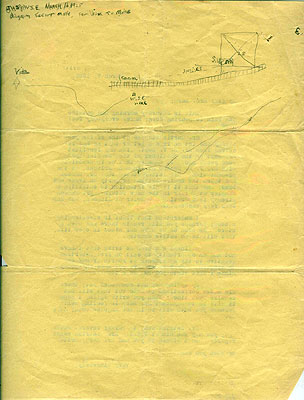
FLOOD, John H., Jr. Carbon file copy,
unsigned, typed letter, JHF, Jr. to Mrs. Earp, 1 p. pencil drawn map, “Diagram
Secret Mine, from Vidal to Mine,” on verso indicating location of Wyatt’s
“secret mine.” [Los Angeles], February 18, 1924 (letter) & March 16,
1925 (mine diagram). Nugget sketch attributed to Wyatt Earp. Photos of
a later (c. 1960) trip to the secret mine.
Flood’s letter reports routine affairs
and comments on reports of Vidal business activity. “I understand that
Vidal is experiencing a boom; perhaps you will remain there and open a
store. As soon as we have our mines in operation, that will be an active
country.” It is the map on the verso that is of most importance.
Wyatt had legitimate registered mining
claims, the “Happy Day” group, in the Vidal area. These claims, however,
were undeveloped and thus not productive. John Flood explained to John
Gilchriese that it was the “secret” mine that drew the Earps to the Vidal
area. Josephine makes occasional reference to this lode in her letters
to Flood. As John Gilchriese explained to us—and he believed that he and
John Flood had visited the “secret” mine together in 1955—Wyatt Earp did
not believe this claim could be filed as it was within the boundaries of
an established Indian Reservation. From Gilchriese’s narration and the
occasional references by Josephine, Wyatt had to wait until there were
no people in the area and then approach the mine under cover of darkness.
Secrecy also demanded that he restore the area after his labors. Flood
reported to Gilchriese that in a few weeks time in the 1920s, Wyatt discovered
about $16,000 worth of ore in the form of nuggets. This was a considerable
sum of money at a time when gold brought about $30 an ounce.
Accompanied by a pencil sketch attributed
to Wyatt of two gold nuggets, on a 1¾” x 8” fragment from a sheet
of ruled paper. The sketch is captioned “Nugget drawings” in a hand which
is neither Flood’s nor Josephine’s. John Gilchriese reported that the sketches
were executed for Flood’s enlightenment during one of his conversations
with Wyatt. Seven vertical creases, possibly from careful folding to put
in a wallet. No place or date is indicated.
Also accompanied by four black &
white photographs taken of and by John Gilchriese during a c. 1960 foray
to the site of the mine. This mysterious group all very good or better
(10,000/15,000)
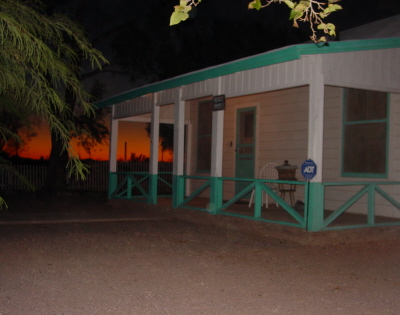
Earp House Sunrise November 2007
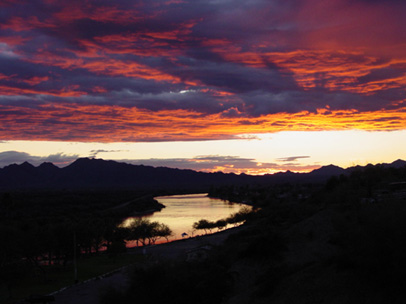
Colorado River sunset near the Earp
Cottage in winter 2005
Where would you like to go next?
 .
..Take
a Tour of Tombstone
.
..Take
a Tour of Tombstone
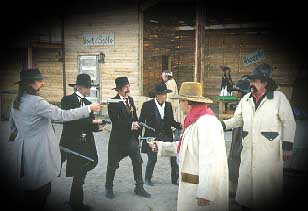 ...Relive
the Famous OK Corral Gunfight
...Relive
the Famous OK Corral Gunfight
 ...Visit
the Earp Home Gift Shop
...Visit
the Earp Home Gift Shop
 ...Join
The legend
...Join
The legend
 ....Head
On Back To Tombstone
....Head
On Back To Tombstone
© -2006-2007 All Rights Reserved
- No Part of this website nor any of it's contents may be reproduced in
any manner.
contact
webmaster.

